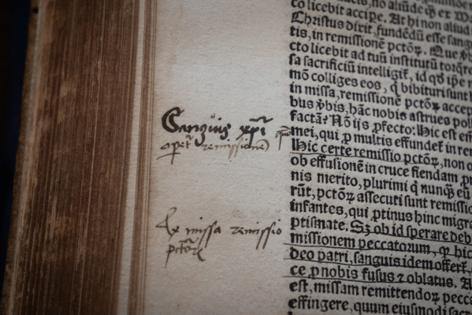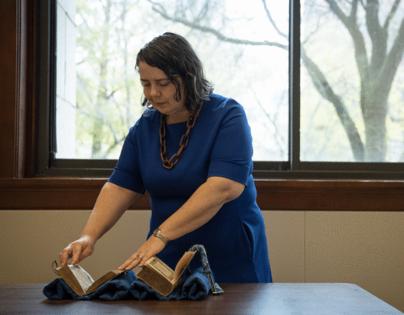A man and his dog find stash of rare books on the sidewalk; 8 months later, library solves the mystery
Published in Cats & Dogs News
CHICAGO -- On an evening walk in Chicago's North Center neighborhood back in early March, Sparky — Robert Miller’s golden brown mutt that weighs 35 pounds and has hunting dog in its DNA — seemingly caught a scent.
“She’s a creature of habit,” said Miller, a retired 75-year-old who has lived in the neighborhood for about a dozen years. “She likes to stay on one side of the street, and for some reason, she wanted to cross over.”
A half a block later, the duo stumbled upon a stash of strewn books.
“It was about 8 o’clock at night. It was dark. It was winter. And I looked around, and there was not another soul around,” Miller said.
As luck would have it, Miller studied history in college and knew what he was looking at: German books from the Renaissance and early modern period. The oldest, he would later learn, was from 1525. Three were written in Latin, three in German and one in French.
Horrified that the books would get damaged, dirty and damp lying in such proximity to a city street all night, Miller scooped them up for safekeeping.
He couldn’t fathom how the delicate vessels of knowledge got stranded on the sidewalk. He wondered whether they had been discarded by thieves who failed to profit off them without provenance — ownership history of valuable objects. Perhaps an irritated lover in a moment of passion took a partner’s books and chucked them outside after a domestic dispute.
Eight months later, a clue dug up by a Newberry Library curator poked fatal holes in both of Miller’s hypotheses. Miller had reached out to the library for guidance, and a bit of sleuthing by the curator, Suzanne Karr Schmidt, led to a neighbor of Miller who collects rare books.
The neighbor, an octogenarian who hasn’t retired, was “tidying up some old archival boxes and accidentally took one with the books out to the trash as well,” according to Karr Schmidt, who explained the books’ mysterious appearance in an article for Newberry Magazine.
“It seems that the box fell on the ground, spilling its contents,” Karr Schmidt wrote. Before it occurred to him to return to look for it, she wrote, “his relatively close neighbors Miller and Sparky had swooped in to protect the books.”
In the puzzling darkness on an unfamiliar side of the street, Miller stuffed the smaller books in his pockets and hauled the hefty ones away in his arms. At one point, Miller managed to pick up Sparky’s poop without dropping the entire bundle.
Upon returning home, Miller started sorting through the finding on his dining room table with his wife. He said he knew enough Latin to figure out that one of the books contained arguments against the teachings of Martin Luther, the German priest who helped begin the Protestant Reformation.
The next morning, Miller took one of the books to a local police station, which was unable to help Miller locate the books’ owner. So Miller contacted the University of Chicago and Newberry Library and asked if they were missing the books.
“They weren’t, but they were interested in trying to find out where they came from,” Miller said.
In photos of the books Miller sent Karr Schmidt, she saw signs of their 16th century owners but no recent institutional markings. That told her the books likely belonged to “an unidentified bookseller or private collector,” not another library. After this round of efforts to locate an owner, according to Karr Schmidt, Miller offered to give the books to Newberry Library.
“I felt like they belonged in some place where they would be appreciated, where they would be cared for properly,” Miller said.
It is considered unethical for a library to accept books with non-existent provenances — record of ownership — without making more attempts to identify recent owners. The library did its due diligence. Karr Schmidt learned that two Midwestern collections each had one of the books but never held the complete set. She also circulated details of the find among the international antiquarian bookseller community to no avail.
The library decided that if someone ever came forward and claimed to be the owner, it would dutifully consider the assertion and give back the books if the proof was deemed convincing.
Then on Nov. 1, while in the process of editing the magazine article about the books, Karr Schmidt stumbled upon a photo of one of them on the website of Austrian book dealer Antiquariat Inlibris. The dealer would inform Karr Schmidt that it sold the book in 2021 and identified to her the Chicagoan who bought it.
On Nov. 5, the owner — who couldn’t be reached for comment — stopped by the Newberry Library, where he was reunited with his lost books, Karr Schmidt said. He even decided to donate two of them to the library — a text supporting Luther written in the vernacular German and one attacking the great reformer in Latin.
Karr Schmidt said someone accessing the stores of the Newberry Library — which, historically, has collected more French and Italian books from before 1800 than German books — may want to view the texts for several reasons.
“They could be interested in the sort of political animosity that’s going on between the pair of these. There were a lot of pamphlets written at this time, pro- and anti-Luther,” Karr Schmidt said. “There’s (also) a lot of visual imagery.”
On the pages of the book written in German, the text is surrounded by ornate woodcut or metalcut borders, some of which feature Luther’s face with a surprised expression.
©2024 Chicago Tribune. Visit at chicagotribune.com. Distributed by Tribune Content Agency, LLC.












Comments